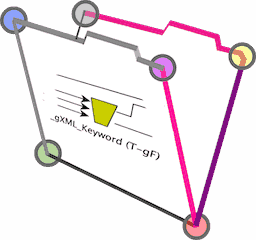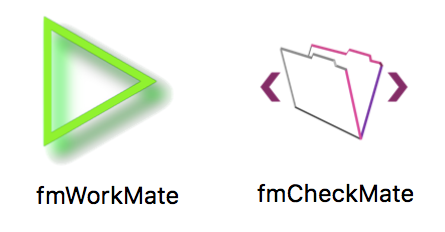- fmGraphIt

fmGraphIt
Connect the dots
The Problem
You’ve got a table with a lot of fields, you want to understand how they work together, which fields are used in which calculations, and how the data flows through the table.
How do these fields work together?
I know, that can be quite a time intensive question to answer!
I’m fed up of trawling though field definitions to understand how fields hang together!
How about a diagramme instead? That’d be worth a thousand clicks?

The Solution
fmGraphIt! A way of visualizing data flow and dependencies between the fields of a FileMaker database table.
Just copy the fields and get the big picture with fmGraphIt in just a few clicks!
For example, here are the fields of the communicaton table for telephone numbers, email addresses, etc. in the advanter ERP system.
- A picture is worth a thousand words!
And an interactive diagramme is worth a thouand beers! 🍻
- Click the image to see it in action!
- Hover on a field to see the calculation and other details
What is fmGraphIt?
fmGraphIt is not a single tool, as such - there is no fmGraphIt file - rather, it is:
- a way of displaying field information in a rich, meaningful way
- a process, starting with an XSLT transformation within the fmCheckMate-XSLT library,
- a set of mapping files to implement those display conventions within the yED graphing tool.
Installing fmGraphIt
To generate a field dependency graph from the field definitions of one table you will need

-
MrWatson’s fmWorkMate toolbox (which includes the fmCheckMate tool)
- Download the latest release of fmWorkMate from GitHub

-
MrWatson’s fmCheckMate-XSLT Library (which includes the graph creation function)
- Download the latest release of fmCheckMate-XSLT from GitHub

-
To visualise this field dependency graph you will need a graph visualisation tool.
-
The free yEd software from yWorks
-
Download the latest version of yEd from yWorks
-
-
some yEd configuration files for formatting the graph (which are to be found in the xml/yEd folder of The fmCheckMate-XSLT Library)
-
Finally, you need
- A step-by-step guide to installing fmGraphIt ( fmWorkMate, the fmCheckMate-XSLT Library, and yEd)
- A tutorial on creating your first Field Dependency Graph
- A Field Dependency Graph Legend
- An introduction to yEd
👌 OK, we are finally ready to go!
Disclaimer:
fmGraphIt’s field dependency graphs are not rocket science—they’re not always perfect—but they provide a quick overview of field structure without needing to create a DDR.
Since the FileMaker clipboard only contains field calculations as a string, the calculation must be parsed. fmGraphIt builds its list of field dependencies by simply (but smartly) searching for occurrences of field names in the calculations.
Limitations:
- False positives: fmGraphIt might falsely interpret text in the calculation (a comment, relationship name,r function name, etc.) as a field reference, if the text matches.
- Relationships are ignored. If a referenced field in a related table has the same name as a field in the current table, fmGraphIt may incorrectly consider this as a reference to the current table’s field.
See How fmGraphIt works for more details on its limitations.
Disclaimer
Before you jump into fmGraphIt you should understand its limits.
Getting Started
Once you’re set up, you can transform your fields into a stunning diagramme with just a few clicks
- Copy the fields of a table you are interested in
- Convert to XML with fmCheckMate
- Apply the Transformation
Analyse > Fields > Create field dependencies graph advancedto create a graphml Field Dependency Graph- This saves the
Clipboard.graphmlfile to your documents folder, and opens it with the default editor
- This saves the
- The graph is displayed in yEd
- Just seeing what looks like a dot?
- No problem, that’s normal, read on.
- Open the property mapper with
Edit > Properties Mapper… - Apply the standard style
- Select
FDG: Template = Default (Node) - click
[Apply] - Click
[OK] - You’l see the dots get shape and colour, but are still all in a pile…
- Select
- Now apply a layout-strategy
- Select menu item
Layout>Hierarchalor press ⌃⌘H - Check the layout settings:
- General
- Orientation: Top to Bottom
- Edges
- Routing Style:
Orthogonal(Polylineis also good)
- Routing Style:
- General
- Try a one-click layout
- Organic - to discover the complex bits
- Select menu item
et voila!
Example Field Dependency Graph
The diagramme shows the field dependencies, or rather the data flow from the (squarish) input fields at the top to the (triangular) calculated output fields at the bottom.
fmGraphIt Field Dependency Graph Explained
Here is how to read the graph…
Field Labels
Each field is labelled with its name and some (cryptic but succinct) metadata:
«field-name»(«data-type»-«storage-type»«field-type»)
Data Type
The data type is indicated by the following codes:
T- Text
N- Number
D- Date
I- Time
M- Timestamp
R- Container
That’s the same letter as the shortcut key for the data type
Storage Type
Storage is indicated by the following codes
$- $-variable (
$-for script variable and$$for global variable) g- global
s- stored
x- indexed (small x = single index)
X- indeXed (large X = double index)
u- unstored
Storage is also indicated by the colour
Field Type
The type of field is indicated by the following codes
O- an initialised Output field (auto enter & no overwrite & no modification)
o- an initialised once field (auto enter & no overwrite but modifiable)
f- a normal (input) field (small f = no frills)
F- a Filter Field (large F = with auto enter & overwrite)
C- a calculation field
S- a summary field
For variables the following codes are used (or rather will be one day):
-- a $-script variable
$- a $$ global variable
Field type is also indicated by the shape
Shapes
The shape indicates the field type:
- ⏹️ Square shapes are input fields
- ▶️ Triangular shapes are output fields
- 🔼 Upwards pointing are data sources
- 🔽 Downwards pointing are data aggregators
- ⏢ Tweeny shapes are a bit of both
- *️⃣ Star shapes are summary fields
The pointier the shape, the more complex the type of field.
The least pointy shape - a circle - represents the simplest of storage structures: a variable.
See the Field Depency Graph Legend for more details.
Colours
The colour indicates the storage type, and follow these simple guidelines:
More colour = more storage, darker = more CPU
See the Storage vs CPU part of the legend for more details.
Top to Bottom Layout Orientation
The shapes of the fields have been chosen to fit a top-down hierarchy well visually.
Data flows from top to bottom
- source fields are at the top, comprising
- normal input fields (with/without Auto Enter)
- non-modifiable metadata fields (‘output’fields)
- for example: id, creation date, etc.
- auto-enter and calculation fields in the middle
- calculation and summary fields are at the bottom
Note: The arrows show data flow rather than dependency
Legend
Here is the legend to the shapes, colours and codes used in the graph:
(Click the image for a large view)
Tooltip - Calculation Type
In the calculation in the tooltip, the kind of ‘equals sign’ used indicates what kind of calculation it is:
=- Calculated field
:=- Autoenter
<=- Lookup
Note: This is a subset of the fmCheckMate Print fields function which uses the following detail
_ID :+1 7- A field with auto-incremented serial number (Auto-Increment)
active : "1"- A field with an auto-enter fixed text (Auto-Data)
Status := "New"- A field with an auto-enter initial calculated value (Auto-Init)
DateDeparture :== DateArrival+2- A field with an auto-enter filter calculated value (Auto-Calc)
Info :=== "Input: " & Quote(Input)- A field with an auto-enter filter calculated value even when inputs empty
RepIndex = ArrIndex+1- A calculated field
_sTotal =∑: Score- A statistic field = Total
_sCount =N: Options- A statistic field = Count
_sAve =∑/N: Score- A statistic field = Average
_sMin =≤: Score- A statistic field = Minimum
_sMax =≥: Score- A statistic field = Maximum
_StdDev =σ: Score- A statistic field = Standard Deviation
_Frac =½: Score- A statistic field = Fraction of Total
_List =∑¶: Names- A statistic field = List of Text
Explore the different Layouts
Extract local views of nodes
Want to focus on a particular field?
- Select it
- Choose one of the Context Views fro the Window menu:
- Neighbourhood - shows the input / output fields around the selected field
- Predecessors - shows the tree of input fields which feed the selected field
-
Successors - shows all the output fields of the selected field
:
Enjoy!
MrWatson

